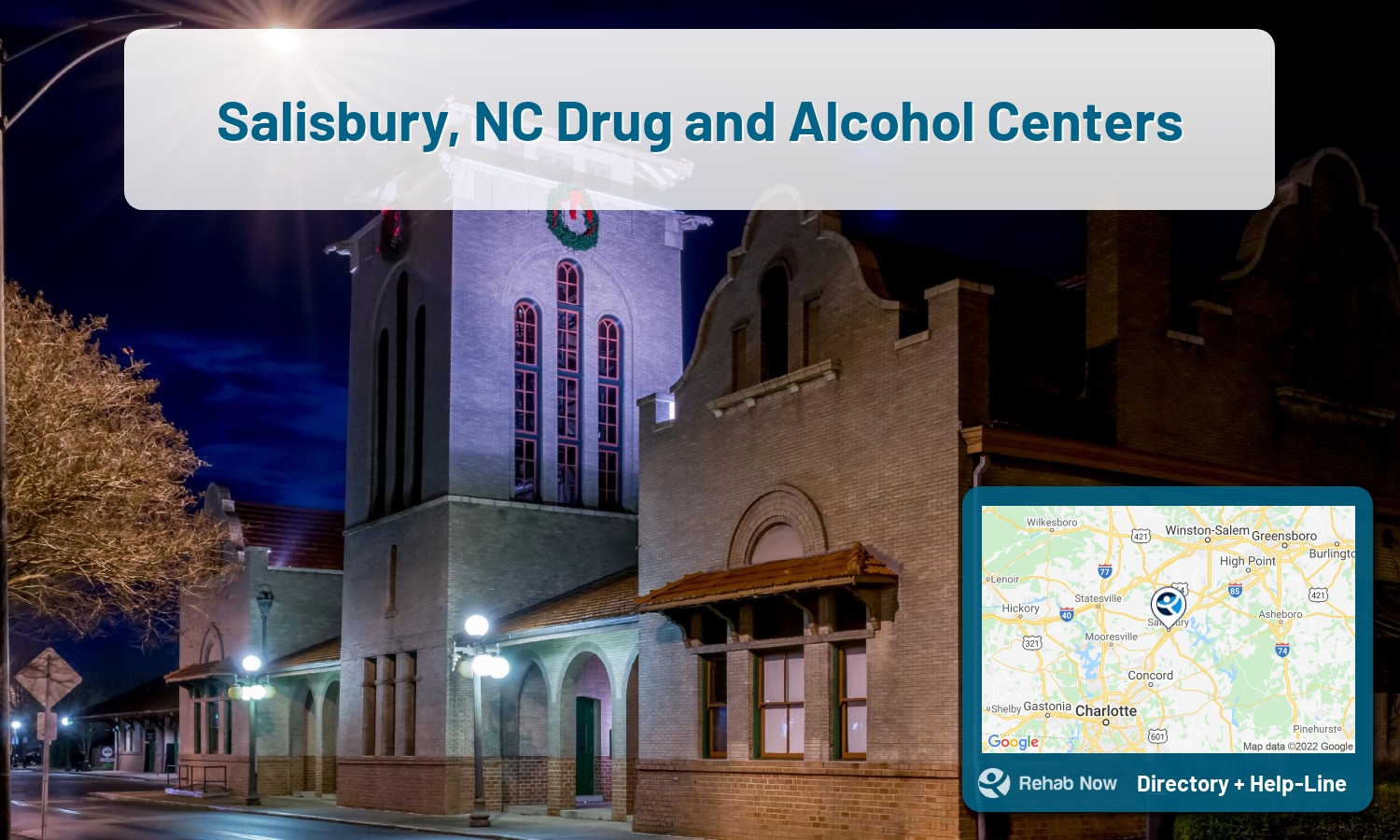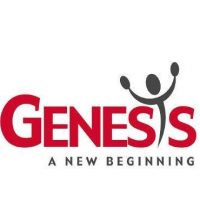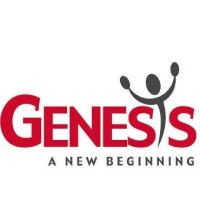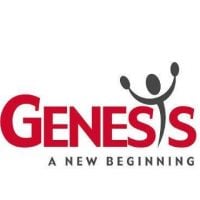Salisbury, NC Drug and Alcohol Centers
The drug addiction problem in Salisbury, NC is definitely a serious issue. According to recent statistics, over 9% of the population in Salisbury has an addiction to drugs or alcohol. The most common drug of choice in Salisbury is marijuana. Although it is not as serious as some other drugs, more individuals are becoming addicted to it and using it regularly.
The drug and alcohol problem in Salisbury, NC is so bad that the police department had to create a special division known as the North Carolina Counterdrug Program in order to deal with this problem. This division is made up of a team that includes police officers, investigators, detectives, and even undercover agents. The NC Counterdrug Program is devoted to finding and stopping illegal drugs in the Salisbury, North Carolina area.
Discover a facility in our list below that fits your needs, or contact us for individual recommendations. There are a lot of available facilities in Salisbury, NC ready to help you or a loved one live a healthy and clean life, free of drug addiction.
One Call Makes This So Much Easier
We will help you find treatment based on your location, budget, and specific needs and help you get started safely.
Free + Confidential Consultation
Browse 14 Centers in Salisbury, North Carolina
Genesis A New Beginning - Salisbury
Genesis A New Beginning in Salisbury, NC provides comprehensive and personalized treatment plans tailored to meet each individual's specific needs and objectives, including detoxification, counseling, family therapy, aftercare support, Dual-Diagnosis treatment, and medication-assisted treatment (MAT), with private health insurance acceptance and both outpatient and residential levels of care.
Alternatives Counseling
Alternatives Counseling in Salisbury, North Carolina is a highly rated addiction treatment facility offering comprehensive services tailored to the individual needs of each client, including drug rehab, intensive outpatient care, aftercare support, and outpatient levels of care, and specialized services such as family therapy and trauma-informed treatment.
Genesis A New Beginning
Genesis A New Beginning is a treatment center in NC that provides comprehensive addiction and mental health services including personalized treatment plans with evidence-based therapies and a variety of levels of care.
Novant Health - Rowan Medical Center offers specialized care for individuals with dual-diagnosis and mental health disorders through personalized treatment options, including evidence-based therapies and long-term stays, while accepting private health insurance and being affiliated with Novant Health.
Daymark Recovery Services in Salisbury provides addiction and mental health services, utilizing evidence-based treatments and offering comprehensive treatment plans, aftercare, and sober living programs with a holistic approach.

Daymark Recovery Services - Rowan Center
Rowan Center in Salisbury, NC, is an addiction treatment center offering various services including aftercare support, drug rehab, intensive outpatient, outpatient treatment, and different treatment methods and therapies such as CBT, DBT, and trauma therapy.
Genesis A New Beginning is a mental health and substance abuse treatment center that offers comprehensive care options including aftercare support and drug rehab programs, tailored to individual needs and requirements, and accepts many major health insurance providers.
Substance Abuse Services in North Carolina provides specialized treatment services for various types of addiction, offering personalized care and support through evidence-based therapies and various levels of care.
Treatment Centers
Treatment Centers in Salisbury, North Carolina offers comprehensive inpatient and outpatient treatment for addiction and substance abuse, providing personalized care and holistic therapies in a supportive and nurturing environment, and addressing underlying health issues while using evidence-based and supportive therapies, with specialized programs for co-occurring disorders, family support, and continuing care services.


Salisbury VA Medical Center
Substance Abuse Services in Salisbury, NC offers comprehensive treatment for alcohol, opioid, and drug addiction as well as dual diagnosis, through a multidisciplinary approach that emphasizes community, compassion, and research-based evidence for the best possible treatment with a qualified staff of clinicians and social workers, offering individualized care plans to ensure the best outcomes, and accepts private health insurance.
Alcohol Abuse Chemical Dependency Counseling Services
Alcohol Abuse Chemical Dependency Counseling Services offers comprehensive treatment programs for alcohol and drug addiction in Salisbury, North Carolina.



AA - Alcoholics Anonymous
Drug and Alcohol Treatment in Salisbury, NC
Luckily, there are many options for drug and alcohol treatment in Salisbury. If you or someone you know has an addiction to drugs or alcohol, it is important to seek drug treatment as soon as possible. The earlier someone enters a drug and alcohol program, the more likely they will be to successfully recover.
The decision to enroll in a drug treatment program is definitely not an easy one. This is because it takes a lot of courage and resolving to admit you have a problem and need help. However, doing so is often the best decision possible because it could save your life or someone else’s in the future.

What Types of Treatment Are Available in Salisbury, North Carolina?
There are a number of drug and alcohol treatment options available for individuals seeking to get sober in Salisbury, North Carolina. Some of the most common treatment options include inpatient and outpatient rehabilitation centers, 12-step programs, and detoxification programs.
Inpatient rehabilitation centers offer a more intensive level of care and require that patients live on-site for the duration of their treatment. This type of program is ideal for those who have a severe addiction and need round-the-clock care.
Outpatient rehabilitation centers offer a less intensive level of care and allow patients to continue living at home while receiving treatment. This type of program is ideal for those who have a mild or moderate addiction.
12-step programs are free self-help programs that offer addicts the opportunity to recover through working with other addicts. Many treatment centers in Salisbury, NC also incorporate these programs into their treatment.
Detoxification programs are ideal for those who are addicted to alcohol or certain drugs but have not yet developed physical dependence.
Drug Abuse Statistics in Salisbury, North Carolina
While drug abuse is a serious problem in Salisbury, there are even more alarming statistics surrounding the issue. Statistics show that individuals who started doing drugs before the age of 13 are four times more likely to become addicted. In fact, average addicts in North Carolina first use drugs at the age of 15.
According to statistics, around 50% of persons addicted to drugs or alcohol will not receive adequate treatment. This is because many addicts are often too ashamed of their problem to admit they need help.
- In 2018, 416 people were admitted into drug and alcohol treatment programs in Salisbury.
- From 2008 to 2018, the number of people seeking treatment in Salisbury, NC increased by almost 30%.
- From 2008 to 2018, the number of overdose fatalities in Salisbury rose by almost 46%.
- In 2017, there were a total of 35 drug-related arrests in Salisbury.
Additional Treatment Centers in North Carolina
North Carolina ranks 29th in the nation for overall substance abuse. Many of the drugs abused in the state are illicit, and many of these are opioids. Prescription opioids are readily available due to the high rates of medical workers prescribing them. The number of prescriptions has increased tenfold since the 1980's. Opioid overdoses are the most common type of death in North Carolina.
Still haven't found the right recovery center? Browse nearby North Carolina cities.
- Mebane, NC (73.8 mi.)
- Raleigh, NC (103.5 mi.)
- Rockingham, NC (64.4 mi.)
- Kannapolis, NC (15.2 mi.)
- Weaverville, NC (117.1 mi.)
- Carolina Beach, NC (185.2 mi.)
- Manson, NC (133.1 mi.)
- Hickory, NC (49.0 mi.)
- Yadkinville, NC (33.6 mi.)
- Clyde, NC (137.3 mi.)
- Youngsville, NC (114.8 mi.)
- Middleport, NC (246.0 mi.)
- Charlotte, NC (78)
- Greensboro, NC (58)
- Raleigh, NC (56)
- Durham, NC (56)
- Wilmington, NC (50)
- Fayetteville, NC (48)
- Asheville, NC (41)
- Winston Salem, NC (29)
What Does Rehabilitation Entail?
Rehabilitation is a process used to help individuals with substance use disorders and addiction problems. This process takes place in an inpatient or outpatient facility. Treatment plans are tailored to each individual, depending on the severity of their addiction and other factors.
During this process, individuals are taught how to do healthy drug-free activities that they can use instead of drugs. For example, many people learn how to listen to their feelings, play sports, or engage in another activity they enjoy instead of using drugs.
The goal of treatment is to give addicts the tools to live a drug-free life and avoid triggers of their addiction. In addition, patients receive various types of care depending on the severity of their addiction. This includes individual therapy, group counseling, family counseling, and many other treatment options.
What are the Benefits of Rehabilitation?
There are many benefits to rehabilitation, and it is something that should be considered for anyone with a drug or alcohol problem. This is because addiction has a negative impact on every area of a person’s life.
In fact, research shows that addicts are more likely to die younger and suffer more health problems than those who do not abuse drugs or alcohol.
Some of the benefits of rehabilitation include:
- Lower instances of relapse
- Decreased drug cravings
- Lower instances of mental illness and other addictions
- Improved physical health
- Increased work productivity and employment rate
- Longer lifespan
- Raised self-esteem and sense of purpose
- Increased sense of responsibility
- Better quality family relationships
- Higher level of happiness and satisfaction with life
What is the Process of Rehabilitation?
The first step to rehabilitation is detox. This is the process in which an addict rids their body of all drugs. During this process, withdrawal symptoms may occur. These can be difficult to cope with because they cause cravings for the drugs addicts are trying to escape.
One of the first steps to rehabilitation is detoxification. This means that addicts will be given medications to help ease off any uncomfortable withdrawal symptoms. Medications are also given to help people cope with cravings.
After detox is complete, addicts are either sent home or admitted into an inpatient or outpatient treatment facility.
Inpatient and residential rehab centers provide more therapy and counseling than outpatient programs, but they can be highly expensive. Outpatient programs are more affordable, but they tend to only provide people with less intensive therapies.
How to Choose Best Drug and Alcohol Treatment Centers
There are many different options for drug and alcohol treatment centers and choosing the right one can be difficult. It is important to find a program that meets your needs and will provide you with the tools needed to successfully recover.
The first step is researching all of your options. Then set up an appointment with a representative from each center you are interested in. It is a good idea to ask about the programs they offer, their price, and what makes them unique.
Once you have heard about their programs, find out about the facility’s success rate and if they are accredited. This can be done through the Substance Abuse and Mental Health Services Administration (SAMHSA). After this, you can narrow down your list to a few facilities that will best suit your needs.
It is important to set up appointments for tours of each facility. During this process, you will be able to see if the program is a good fit for your needs and find out more about the facility’s reputation.
There are many benefits to attending a drug and alcohol treatment center. Rehabilitation will provide addicts with the tools they need to live a successful, drug-free life. While in treatment, addicts will be able to determine the cause of their addiction and learn how to avoid triggers that lead to relapse.
Ready to pick a rehab center in Salisbury? Get off alcohol, opiates, and other drugs, by selecting top drug rehab centers in North Carolina (888) 674-0062.








